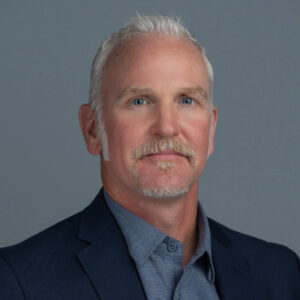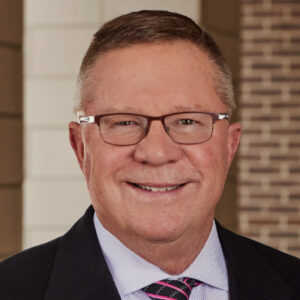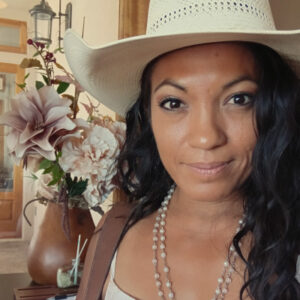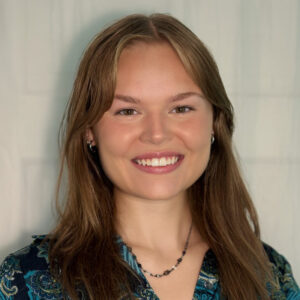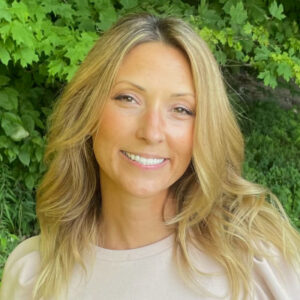- All
- Arizona
- Colorado
- Indiana
- Kansas
- Michigan
- New Mexico
- Ohio
- Wisconsin
Anonymous OH Farmer 425
“I believe in both solar and wind. On my farm, I have one wind turbine. I have had a great experience of the company upkeeping the turbine. I had a few hiccups in the beginning with my land flooding around the turbine, but I called the management company, and they came out that same week to address the flooding. Anytime I have questions or issues, they always get fixed very quickly. It’s been a few years now, and nothing has needed work.”
Scott M.
“Behind our dairy operation we have 56 acres, half of which have solar panels, as well as a few panels on our barns for our own use. We were very open-minded to renewables, and our lease gives us extra financial support to run our dairy farm. We think solar is a good thing, and we’ve had a very good experience with the panels on our leased land. This was the first full year we were able to sell energy back to the company, and we were happy to have the property tax adjustment because of that. We’ve been seeing so much growth and development in the country, and we would much rather see the land go to solar to produce energy than have it be sold to a housing development. Plus, at the end of our contract, we could switch the land back to farmland if we wanted to, an option not available if we sold to a home developer.”
Anonymous IN Farmer 425
“My late husband and I have one turbine behind our farm on land that we rent out to some of the bigger farmers around here. The payments have especially helped with expenses. We were on Medicare so the extra income that the turbine brought definitely was a blessing for us when we didn’t have much left over after the bills were paid.”
Carla Lugo and Tricia Topasna
“After retiring from the military, I wanted to do something purposeful, and that’s when I started farming. There’s a lot to do on the farm, and having solar energy would make our work sustainable and affordable. We have looked into solar energy projects for our farm and would like to see the process be more accessible for everyone, especially for landowners like us. Having access to solar projects would mean access to resources for ourselves and others.”
Potawatomi Tribe
“I am a farmer at Bodwéwadmi Ktëgan farm, which is owned by the Forest County Potawatomi. We are very supportive of solar, both residential and utility-scale, and the tribe has been putting solar on a lot of our tribal properties. This is motivated by both a desire to be more self-sufficient and be environmentally sustainable, and the tribe has an energy department that is dedicated to these goals.”
Anonymous WI Farmer 425
“We are crop and beef farmers in Cassville, Wisconsin, and we host 40 acres of utility-scale solar panels, a substation, and electric poles on our land… On the ground that they installed the panels, it was cropland that we didn’t need because they put it on our worst rocky fields. It wasn’t a big deal to temporarily rent that land, and we have been very pleased to have the support of the project to continue to run our farm.”
Patti Shinn
“I wanted to make sure we created an ordinance that was fair to everyone. If people want turbines on their property, that’s their business. I firmly believe that people should have the right to decide what to do with their own land.”
Darrell NM
“The wind turbines on my property have been a blessing, providing a reliable additional stream of revenue. Overall, I’m grateful for the benefits wind energy has brought to my land and am hopeful that more people will consider renewable energy options tailored to their unique circumstances.”
Kenneth Cox
“I live in New Mexico, where my family and I manage a ranch that includes wind turbines. We’ve been fortunate to work with developers who respect our property and take care to maintain it, ensuring gates are always closed and that the land is treated with care. Overall, wind energy has been a great addition to our ranch, helping us diversify our income while continuing to care for the land and our livestock.”
Ashley Beery
“Leasing my land for the Richwood Solar farm was the only option that we saw for maintaining it. Both my mother and myself have serious medical complications, and my father is in a nursing home. We have been struggling financially and had to sell my father’s home in the past. We did not want to lose our land, and with me being an only child, solar farming provided the best solution to our problems.”
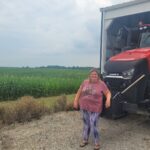
Pedro Soliz
“I am Chiricahua Apache, and my name is Blue Horse. I believe renewable energy is going to be the engine of our survival. I used to farm, and now I’m starting to get back into building greenhouses to help feed the homeless and the poor. We have a water problem in Colorado, so this is a way to help combat that. It’s not about working hard, it’s about working smart. My greenhouses will have solar installed on them. I really believe in renewable energy. I believe we all need each other right now.”
Heather Secrist
“Having solar on my property was a dream of mine; our farm has clean air, clean water, clean food, and clean energy is the icing on the cake. The Rural Commerce grant helped us save 25% in installations, and MinnSolar was a fabulous help in that. We have designed our farm to be net zero in energy usage.”
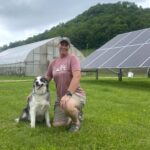
Sam Roberts
I am a BIG advocate for renewable energy due to seeing some of the devastation from fossil fuel and non renewable energies in my town and towns like mines. I would love to see communities like my own to thrive more economically as a result of using renewable energy that also combats the devastation from non renewable fossil fuel.
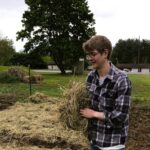
Jamie Newkirk
As property owner of {a} family farm, I feel we should have the right to decide if one form of renewable energy is right for us, not the local decision makers.
Amera Platt
I support renewable energy because I want to save the planet. why else? Doesn’t everyone want to save the planet?
Geronimo Oplinger
I am an old man, I believe in science, and I follow the facts. Renewable energy makes sense, and is the right path to help clean up the planet. That is why its important to have organizations like Farm-to-Power.
Howard DeForest
It [Renewable energy] is one of the many ways to make our electric infrastructure more efficient and creates jobs to maintain and sustain our growing use of energy
Tinu Daboiku
I don’t have a lot of experience with farming in the conventional sense, but I do have a passion for working with and for the Earth towards self-sufficiency. My composting business helps support the sustainable lifecycle that I want to live, and I would love to get to a point where I can utilize renewable energy sources on my farm and property so that I don’t have to pay for a resource that can and should be free.
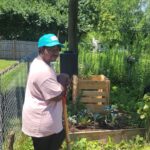
Kat Urquhart
It’s important for farmers and ranchers to join up with renewable energy. It would be a beneficial to both parties. Agriculture these days is hard enough, leasing a portion of land for a lease would make the hard times a little easier.

Byron Kominek
“Haying 24 acres doesn’t pay the bills let alone provide sufficient income for a family – so, in 2017, our family began investigating an alternative pathway to producing revenue on our land – building a solar array… The electricity sales are far higher than what hay ever made for us, and because we designed the system for agrivoltaics, we keep the land under our solar panels in agricultural production. Shade from the panels keeps moisture in the ground longer and reduces the large swings in daily temperatures, both being extremely helpful in a semi-arid or arid climate like the Front Range of Colorado.”
Fief Family Farms
We had been interested in grazing our sheep in a solar array for a while when United Agrivoltaics contacted us about a project 3 miles down the road from our farm. We get paid to graze and don’t have to worry about any of the maintenance work or costs. We are really impressed with the operation, we are not grazing any differently than we would be on our own property. When you can combine solar and grazing it just makes sense- it’s good for the environment and energy production and it can create an additional income for the farmer.
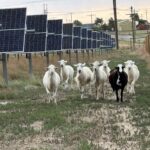
Anna Clare Monlezun & Giovanni Taormina
We love living off grid, reliant on solar and wind power, we feel its gratifying to be living off of clean energy and to know our day-to-day activities are not contributing to fossil fuel extraction…. We graze our sheep, cattle, poultry, and horses around our solar array. and it’s integrated into the pastures. It doesn’t interfere with the grazing management, and we can still operate and rotationally graze as usual.
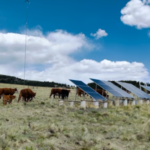
Nathan Weathers
I am interested in putting solar panels on my land and where my cattle graze. Why not make money on a shade structure? If we can create another income stream, lower costs, and still graze cattle, its a win-win.
Steven Hermesch, Kansas
I have a wind turbine on my farm, and I’ve had it on my farm for about four years. I have had a 100% positive experience with it.
Steve Gwinnup, Falmouth, IN
I had a signed lease wind a wind farm, as did many of my neighbors. The County Commissioners, who had invited the wind farm to the county, reversed their intentions of commissioning the project because of local opposition and pulled the plug. Later I signed a lease with a solar company, but it was stopped because a neighbor would not let us cross their property to gain a connection to the grid. So much for my property rights in my home community. I have since sold my farm and purchased a ranch in Tennessee.
Beverly Johnson, Longmont, CO
I have a well on my farm, and I am very fortunate to have a water source on my property. I am currently looking to convert that pump to solar to have it run with renewable energy and save money. We have the power from the sun, so we should use it.
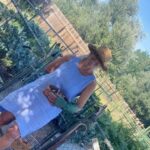
Michael Anderson, Colorado
As a master electrician, I have a good understanding of electrical efficiency. I have looked into doing some solar energy while continuing my faming practices. I have a well on my property, and I see a lot of potential with having solar energy on my farm.
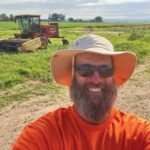
Jamie McEndree
“We have wind turbines on our ranch, and we’ve had a good experience. We had a horrendous blizzard way back, and [the developer] brought bull dozers in and helped cleared the snow. A neighbor a while back had a fire on their property, and one of the employees of the wind farm called it in.”
Nathan Troudt, Wiggins, Colorado
“The process was very simple, and the company was very fair in every single aspect of the process. The transmission lines are easy to farm around and do not interfere with our Agricultural Production whatsoever. The people involved made sure the environmental impact to the land was minimal, and the great care and respect was amazing. More electrical infrastructure is needed to ensure we stay competitive with our global economy. To be able to be a part of ensuring the electrical future not only of the Western Region but for all of the United States is very rewarding.”
Tammy Thompson
“I have two wind turbines on my farm, and we receive payment for the lease on them. They financially help support my farm.”

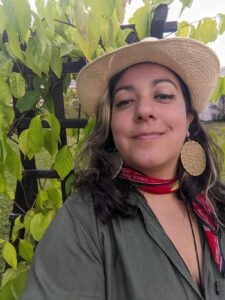
Michelle Suarez

 Sarah Horton
Sarah Horton
Sarah’s journey into organizing began as a social worker, where she developed a deep commitment to supporting underrepresented communities. She transitioned to political consulting, leading statewide ballot initiatives, managing electoral campaigns, and training volunteers in effective community engagement. Most recently, Sarah spearheaded a successful effort to increase funding for public parks in Lexington, Kentucky.
Mandy Bonestell
 Nadia Neziri
Nadia Neziri
Nadia Neziri is a Wisconsin Field Organizer based in Milwaukee, Wisconsin. Nadia holds a bachelor’s of science in environmental policy and planning, with a minor in environmental science from the University of Wisconsin – Green Bay. Nadia’s grandparents were farmers, and she was raised in rural northeast Wisconsin, where many of her friends and neighbors came from farming families. Through college she became involved in food systems, conservation work, and land stewardship, and worked in several internships and jobs to support our shared environment and natural resources. From planting over 2,500 trees while working at a nature preserve, to assisting in environmental policy writing for the UW system, to canvassing for supporters of farmers and rural Americans during the 2022 midterm election, Nadia has been actively engaged in conservation efforts since she was 16. Nadia has long aspired to work in agriculture in some capacity, and she is excited to pursue that dream with Farm-To-Power.
 Hayden Samples
Hayden Samples
Hayden is an experienced political strategist and consultant with over nine years of experience in campaign management, organizing, and finance, Hayden has played pivotal roles in political and advocacy efforts. He specializes in developing innovative strategies to engage voters and volunteers, foster community relationships, and drive impactful campaigns.
Passionate about creating a better environment, Hayden is dedicated to promoting equity and sustainability through his work, striving to empower communities and advocate for systemic change. This approach reflects his drive to build a more inclusive and environmentally conscious future.
Ben Kelahan
Ben Kelahan is a co-founder of Farm-To-Power. He has over three decades of experience in federal, state, and local legislative advocacy campaigns. Ben’s specialties are coalition building, grassroots organizing, government relations, community engagement, political consulting, and lobbying. To that end, Ben also currently serves as Chairman of the Board for The Advocacy Group (TAG), which brings together top-tier lobbyists nationwide to exchange best practices and compare client issues.
He is also the founder and executive director of ReNew Mexico and co-founder of Western Freedom, two Western coalition-based organizations fighting for legislative and regulatory changes within the energy sector.
Ben resides in Loudoun County, Virginia, with his wife and kids.
Ryan Hoaglin Jackson
Ryan serves as Farm-To-Power’s National Field Operations Director, supporting our field staff across the organization with training, data, and reporting needs.
After many cycles of volunteering on campaigns, Ryan translated this experience into full-time activism in 2021, organizing for statewide electoral campaigns and eventually working as a campaign manager for down-ballot races. Most recently, he worked in healthcare advocacy, working to ensure equal and unfettered access to a variety of essential healthcare services.
He is excited to bring this skillset to the fight to protect our planet and empower rural communities to energize our future in a sustainable, reliable way.
Ryan lives in a rural county in Southwest MI with his husband, 2 dogs, and 4 cats.
Michael Dora
Farm-To-Power recently announced the addition of Michael Dora as their Indiana State Director. Most recently, Michael has served USDA Rural Development as their State Director, where he aided in awarding many REAP Grants throughout rural Indiana to small businesses and farm families.
Michael studied production agriculture as a Boilermaker and then went on to start farming with his wife to grow a first generation operation to nearly 5000 acres of row crops, raising cattle and managing an 800-sow farrow-to-finish operation. Michael served his local community on the school board, as an EMT on their local the volunteer fire department and now serves the largest signally accredited Community College in the nation, Ivy Tech.
Michael and his wife Denise enjoy evening golf cart rides around their lake community and watching their grandchildren fish and play sports.
Michael understands and believes in property rights and the ability of farmowners to be able to use their land in a manner that allows sustainability on the farm.
Steve Boe
Steve Boe is a native of Taylor, Wisconsin, where he grew up on a small 40-cow dairy farm in western Jackson County. Boe graduated from Blair-Taylor High School in 2002 and received a degree in agricultural education and political science at the University of Wisconsin-River Falls.
Currently, Steve has worked as a research assistant for Representative Mark Radcliffe in the Wisconsin State Assembly, as a FFA advisor at Alma Center-Humbird-Merrillan High School, as the Director of Local Affairs and District 4 Coordinator for the Wisconsin Farm Bureau, and most recently was the agriscience teacher and FFA Advisor at the Melrose-Mindoro School District.
Before his work, Boe served as a congressional intern for Congressman Ron Kind in Washington. Steve’s experiences have allowed him to become a leader in the agriculture industry, gain experience in policy, and be in touch with local communities in Wisconsin.
Steve is active with the Taylor FFA Alumni, member of Taylor Lutheran Church, is on the Jackson County Fair Board, and serves as the Co-Service Director for the Taylor First Responders. He is the past president of the Jackson County Thrivent chapter and served as a State FFA Officer from 2003-04.
Mati Ihinger
Marilyn “Mati” Ihinger is a Wisconsin Field Organizer based in Eau Claire, Wisconsin. Mati holds a bachelor’s in politics and government and international relations from the Paris Institute of Political Studies, Reims Campus, and has a year of studies at Northwestern University.
She has experience in community engagement and local organizing through her work with the Eau Claire City Council and her campaign background across Wisconsin’s 3rd congressional district.
Sam Roberts
Sam is from rural southeast Ohio, where he helps operate a community nonprofit organization, Morgan Community Support and Solutions, with other alumni from his high school. Having obtained his Masters in Public Administration from Ohio State University with a focus on nonprofit management, Sam is pursuing a career in the public and nonprofit sectors to continue building his skills and knowledge that he can take back to his own nonprofit organization.
Being from rural America and having an undergraduate education in STEM, Sam is passionate about the unique problems that rural Americans face and the solutions that Farm-To-Power aims to provide.
Kate Stymiest
Kate Stymiest (she/her) is a Field Organizer with Farm-to-Power in Michigan and a proud Alma College graduate. She is passionate about promoting renewable energy and working closely with farmers, landowners, and environmental organizations to make a positive impact.
Kate joined Farm-to-Power because she believes in the power of grassroots organizing and the importance of renewable energy for our future. She is excited to be part of this movement and to work toward a greener, more sustainable Michigan.
When she’s not organizing, you can find Kate exploring the outdoors with family, diving into a good book, or relaxing with her cat.
Rachael Stewart
Rachael Stewart is the Southwest Regional Director of Farm-To-Power for New Mexico and Arizona. She is currently a rancher in southern Arizona and a mother to four children. Rachael transitioned from fitness to farming in 2020 and never looked back. She is passionate about animals, the environment, and helping her community.
Rachael founded a non-profit organization that helps small farmers/ranchers grow by gaining access to resources and land. Rachael completed a Bachelor’s Degree in Global Business and a Master’s Degree in Business Administration (MBA). She works with the National Young Farmers Coalition and is on the board of Slow Food Phoenix.
In her spare time, she loves to work on her ranch, Stewart Pastures, and spend time with her horses.
Karson Miller
Karson Miller is our Field Community Organizer for Northern Indiana. Karson recently graduated from Huntington University with a BA in Political Science, History, and International Development Studies while receiving many awards from the History Department, including the Ron Frank Memorial Award for Outstanding Scholarship.
Over the last few years, Karson has garnered a lot of experience in local politics, grassroots organizing, and community engagement with various political campaigns and advocacy groups while attending college.
Karson also enjoys being involved with local churches and bible studies, spending time with his fiancé, reading, and free-lance writing in his spare time. Karson resides in Huntington, Indiana.
Myranda Montoye
Based out of Oberlin, Ohio, Myranda Montoye is an Ohio Field Organizer with Farm-To-Power. She is a recent graduate from Oberlin College, where she studied Economics and Politics.
Originally from Michigan, Myranda grew up an active member of her county 4-H program, and continued to work with 4-H during her college years. Also during her college career, Myranda acted as a community organizer focused on non-partisan voter registration and voter education efforts on her campus and in the broader community.
Myranda is excited to bring these experiences to her work with Farm-To-Power, and to help rural landowners take advantage of renewable energy opportunities in Ohio.
Davina Bryan
Davina Bryan is the Michigan State Director with Farm-To-Power. As a business owner and trade educator, Davina became an advocate for economic and educational opportunities within underserved communities. Inspired to effect change, she attended Grand Valley State University and graduated with a Bachelors of Science in Integrative Studies and an emphasis in Human Environmental Relationships.
Her work includes nonprofit fundraising, strategic partnerships and community engagement. She is also an active member of area nonprofit collaboratives. In 2022, Davina founded Bring The Food Fight Home, an educational advocacy group dedicated to connecting consumers with the rich history of rural American farming and bringing awareness to the issues impacting producers and their families today.
With her husband and four children, Davina built a small hobby farm outside of Grand Rapids, Michigan where the family kept goats and chickens with a little help from a loyal guardian Great Pyrenees and a few hard working barn cats.
Davina’s commitment to the Farm-To-Power mission is rooted in the principle that freedom and land rights are hard fought, inseparable American assurances. She believes that American farmers have the knowledge necessary to usher us into a future of clean, sustainable technology and it should be our priority to ensure that their voices are heard. Davina currently resides in Kent County, Michigan.

Don Coram
Don Coram embodies the code of the West, having been born and raised in Montrose County, Colorado, on a family farm/ranch operation. With a background spanning ranching, environmental reclamation, small business, and over 25 years in mining, Don’s life has been marked by a commitment to hard work, honesty, perseverance, and a profound pride in preserving the western way of life.
From 2017 to 2023, Don served as a State Senator for Colorado’s 6th district in Southwest Colorado. Initially appointed to fill a vacancy in 2017, he later secured election to a full term in 2018. However, redistricting prevented him from seeking reelection to the post in 2022.
During his tenure in the Senate, Don’s influence extended across several key committees, including Agriculture, Livestock, & Natural Resources, Judiciary, Water Resources Review, and Wildfire Matters Review. His tenure was marked by significant legislative achievements and a tireless commitment to representing the interests of rural Colorado. Don effectively advocated for policies promoting economic growth, environmental stewardship, and the well-being of agricultural communities.
Prior to his senatorial role, he served as a State Representative for District 58 from 2011 to 2017. Over his six-year tenure in the House, Don served on Agriculture and Natural Resources, Transportation and Energy committees, and as Vice Chair of the State Veterans and Military Affairs Committee. He was also appointed by the Speaker of the House to serve on the 2010 Colorado Congressional Redistricting Committee.
Known for his effectiveness as a legislator, Don earned a reputation as a fierce advocate for rural Colorado, embodying the cowboy spirit in his commitment to the land and its people. He often emphasized that the “R” behind his name stood for RURAL and symbolized his dedication to those communities and the values of the West. His willingness to collaborate across party lines in pursuit of legislative priorities exemplified his dedication to serving all constituents. Today, Don maintains close relationships with former colleagues from both sides of the aisle, advocating for a focus on relationship-building over divisive rhetoric to better serve our communities.
Before his tenure in state legislature, Don held roles as an elected Director and Treasurer of Montrose County School District RE-1J, as well as Treasurer and President of what is now known as the Technical College of the Rockies. Don and his wife of 57 years, Dianna, continue to call Montrose home, embodying a deep connection to their families, community, and the values they hold dear.

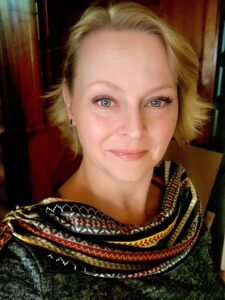
 Nadia Neziri
Nadia Neziri Hayden Samples
Hayden Samples